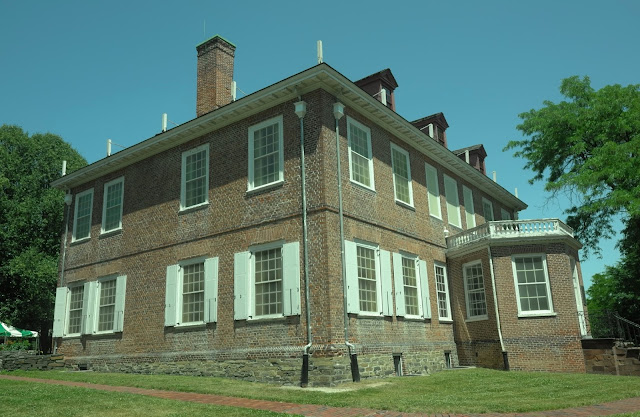 |
| Schuyler Mansion, Albany, NY |
 |
| General Philip Schuyler |
 |
| Wallpaper Schuyler Mansion, Albany, NY |
Historian Richard Ketchum wrote, "Schuyler resembled General George Washington, with whom he had struck up a warm friendship after they met in 1775 and to whom he was indebted for his present command (Northern Department). Like Washington, he was wealthy, with large landholdings. He was a member of one of the oldest and most prominent families in the Hudson Valley and related to many of the others -- the Van Schaicks, Livingstons, and Van Rensselaers, one of whom was his wife, Catherine." (Source: Saratoga: Turning Point of America's Revolutionary War, 1997, www.amzn.com/0805061231).
In 1777 General Burgoyne invaded New York from Canada with about 8,000 troops. He hoped to rendezvous with Lord Howe in Albany cutting the rebel colonies in two. Burgoyne seized Fort Ticonderoga (the "Gibraltar of the North") after its American Commander, St. Clair withdrew his forces that were outnumbered about 3 to 1.
The Continental Congress, disappointed with the loss of Ticonderoga, replaced Schuyler with Horatio Gates (see...http://americanconservativeinlondon.blogspot.com/2016/09/american-forts.html). Even before "Granny" Gates could assume command, however, Burgoyne's offensive was in trouble. On August 16 Burgoyne's "Hessians" (many were in fact from Brunswick, and other parts of Germany) were defeated at the Battle of Bennington. After the battles fought around Saratoga in upstate New York Burgoyne ended up surrendering his entire army of nearly 6,000 men. The Battle of Saratoga led directly to French intervention in the American Revolution culminating with victory at Yorktown in 1781.
Schuyler's selection of Benedict Arnold was a key ingredient for American success in the Saratoga campaign. Gates famously argued with Arnold and even dismissed him from command. Arnold, disregarding his dismissal and fueled by rum, provided the inspirational leadership in the battle of the Wheat Field on October 7, 1777.
After Burgoyne's surrender he was briefly held as prisoner of war at General Schuyler's home in Albany. It was at the Schuyler Mansion that Burgoyne wrote letters back to England blaming his defeat on the failure of Lord Howe to cooperate in his offensive. Howe had captured Philadelphia rather than supporting Burgoyne's southern thrust. Burgoyne wrote, "I have been with my Army within the Jaws of Famine, shot (through) my hat and waistcoat, my nearest friends killed around me."
Another Schuyler estate in New York worth some 10,000 pounds was burned by Burgoyne's forces during the Saratoga campaign. When Burgoyne expressed regret at its destruction Schuyler, the consummate gentleman, shrugged it off as being "the fate of war".
Burgoyne's surrender was the ultimate vindication for General Schuyler. Fort Ticonderoga proved to be a trap for the British Army.
In 1777 General Burgoyne invaded New York from Canada with about 8,000 troops. He hoped to rendezvous with Lord Howe in Albany cutting the rebel colonies in two. Burgoyne seized Fort Ticonderoga (the "Gibraltar of the North") after its American Commander, St. Clair withdrew his forces that were outnumbered about 3 to 1.
 |
| Hudson View, Schuyler Mansion, NY |
 |
| Benedict Arnold Window St Mary's Bayswater, London |
 |
| Interior Schuyler Mansion |
Another Schuyler estate in New York worth some 10,000 pounds was burned by Burgoyne's forces during the Saratoga campaign. When Burgoyne expressed regret at its destruction Schuyler, the consummate gentleman, shrugged it off as being "the fate of war".
 |
| Alexander Hamilton, Schuyler's son in law Schuyler Mansion, Albany, NY |
You can find signed copies of our books at
these web sites...
Or regular copies on Amazon...
Or on Kindle...
Listen to my interview with Bob Cudmore...http://bobcudmore.com/thehistorians/tracks/ChristopherKelly(August2017)(29)(mp3).mp3
And my interview...www.thebook-club.com/blog/bookshelf-interview-with-christopher-kelly
And my most recent interview...http://www.wbur.org/hereandnow/2018/08/17/america-invaded-christopher-kelly



No comments:
Post a Comment